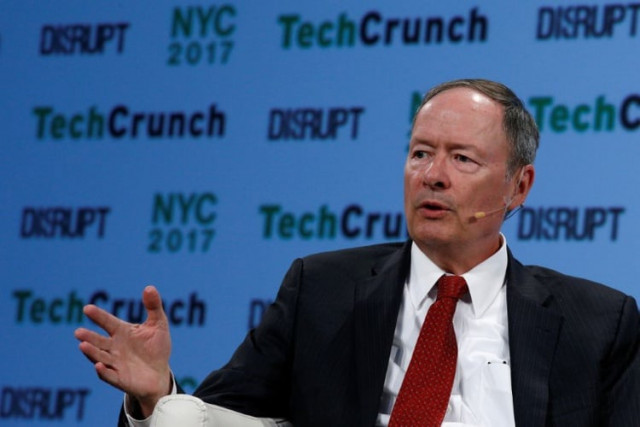Ex-NSA chief's startup raises $78m, helps defend US power grid
Five major US energy suppliers have deployed IronDome to help share data on cyber threats in real time, says founder

Keith Alexander, president and CEO of IronNet Cybersecurity and former Director of the National Security Agency, speaks during the TechCrunc. PHOTO COURTESY: KFGO
The Fulton, Maryland-based company plans to disclose the financing on Thursday as it releases the first details about deployment of new threat-sharing technology it has developed, which is dubbed IronDome, Alexander said.
The series B round was led by London-based investor C5 Capital and joined by existing investors ForgePoint Capital and Kleiner Perkins Caufield & Byers.
World Economic Forum leads creation of fintech cyber security
IronNet declined to disclose the company's overall valuation following the financing, which is in addition to a $32.5 million series A round announced in September 2015.
The company, whose 150 employees include former high-ranking officials from US military and intelligence agencies, said it will use the funds to develop cyberdefense tools and support other growth initiatives.
Five major US energy suppliers deployed IronDome in November to help them share data on cyber threats in real time, Alexander said in an interview.
Overcoming cyber security challenges need of the hour: NSA
The company intends to use the funding to set up similar IronDome systems for the healthcare and financial firms, Alexander said.
"If our nation is under attack by another nation, we need to be able to share information in time to be able to prevent it," he said.
IronNet developed IronDome to be faster and more automated than traditional methods used for sharing information about cyber threats, he said. IronNet declined to disclose the energy suppliers who are using IronDome, citing customer confidentiality.
It said those companies collectively serve 25 US states. The energy providers adopted IronDome amid growing concern among about the threat that hackers pose to the US power grid and other critical infrastructure.
The US government has issued multiple warnings in recent years about attempts by Russia, North Korea and Iran to infiltrate those organizations.
The Trump administration in March accused Kremlin-linked hackers of gaining remote access to energy sector networks, though it did not identify specific victims. Alexander ran the NSA from 2005 to 2014, making him the agency's longest-serving director.
Booz Allen says awarded $621 million US cybersecurity contract
He was at the helm of the NSA in 2013 when former intelligence contractor Edward Snowden leaked data about classified US surveillance programs that sparked an international debate about digital privacy.
"You want to protect civil liberties and privacy and you want to protect critical infrastructure," Alexander said. "We believe we can do both."






1721969212-0/BeFunky-collage]-(35)1721969212-0-208x130.webp)












COMMENTS
Comments are moderated and generally will be posted if they are on-topic and not abusive.
For more information, please see our Comments FAQ